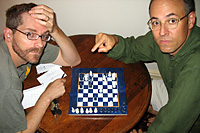Park Slope author David Shenk is hawking a new book — a remarkable history of chess — which is great news for readers and bad news for me.
See, being friends with David Shenk means signing onto whatever obsession is fixating him at any given moment. After his first book — “A Dictionary for Deadheads” (Doubleday) — came out in 1994, I spent two months listening to “From the Mars Hotel” on Shenk’s old hi-fi trying to figure out if “U.S. Blues” was a great metaphor for American policy in Vietnam or just a bad song (I determined the latter, sorry Deadheads).
In 1997, Shenk coined the term “Data Smog” (HarperCollins) to describe how technology was destroying our lives. Shenk’s vision of the future was so apocalyptic that for at least six months, I was too scared to multi-task. Even today, if I find that I have more than three windows open on my computer screen, I force myself to step away.
Then he wrote “The Forgetting” (Doubleday, 2001), a book about Alzheimer’s Disease that was so seminal that Dan Rather did the back-cover blurb.
Thanks to that Alzheimer’s book, every time I forget the combination to my gym lock or my wife’s name, I am reminded that I am well on the way to becoming a dribbling old man within the next four years (give or take).
So perhaps I should be relieved that Shenk has focussed his considerable intellect on chess in his new book, “The Immortal Game” (Doubleday). Instead of having to worry about my limited appreciation of Jerry Garcia, the way in which technology is destroying my life, or my atrophying gray matter, I merely have to play chess.
The problem is, playing chess with David Shenk is a little like root canal. Like a dentist chastising you for not brushing properly, Shenk starts every game with a taunt, offering you the white pieces because “I’m the better player.” And like the dental procedure, Shenk’s own clumsiness at the game anesthetizes you into a state of calm. Of course, that tranquility is broken when you follow his bad moves with your own. And the entire procedure ends with humiliation, knowing how easily it would have been to beat him, and be spared the humbling post-game lecture.
Shenk’s hubris is particularly ironic, considering that when he started researching his book four years ago, he was a “lowest-level player,” he said.
“I knew how the pieces moved and I knew the rules, but that was about it,” he said. Now he describes himself as a “three or a four.”
Despite his own ineptness at the game, Shenk’s book makes a compelling case that chess is not only one of man’s great pastimes, but a metaphor for the development of human intellect.
“The history of chess is the history of man coming to grips with complexity,” Shenk said, while setting up the board. “Religious figures, warriors, politicians, scientists used chess to understand complex dynamics. But the bottom line is that it’s a great game.”
Not so great a game that Shenk and I couldn’t defile it.
Shenk opened with e4. Frankly, I was expecting that. So was virtually every chess player in the world.
After some diplomatic niceities (my knight and his knight are now dating), Shenk made the game’s first blunder — Qa4, as they say in the chess geek magazines — moving his queen into harm’s way without so much as a call to his editor.
“I really screwed myself here,” the Great Author said, retreating his queen all over the board like Washington fleeing across the East River.
Shenk became so focused on protecting the monarchy that I managed to get up one bishop.
But soon, the hunter would become the hunted. While I wasted time pursuing Shenk’s queen, I failed to develop the other side of the board and Shenk fought back. But victory was still in my grasp after Shenk’s 19th move, d4.
Up by a bishop, I should’ve traded queens, but something inside me wouldn’t allow me to willingly give up a queen (full disclosure: That’s not what they taught me in the chess club at Ardsley Middle School. Yes, I am a geek).
Having failed to press my advantage, Shenk ground me down with his numbingly deliberate style, spending minutes to consider every possible good move (the problem with that strategy, of course, is that it wrongly assumes I will make a good move).
In the end, Shenk won mostly because I finally got too bored to go on. It was a war of attrition and I attrited.
But Shenk was pleased: “I almost lost — that was exhilarating,” he said. “Wanna play again?”
Oy, why can’t this guy write about food?
Not to be outdone, Kuntzman has his own book, “Chrismukkah: The Official Guide to the World’s Most-Beloved Holiday” (Sasquatch), coming out next week.

























